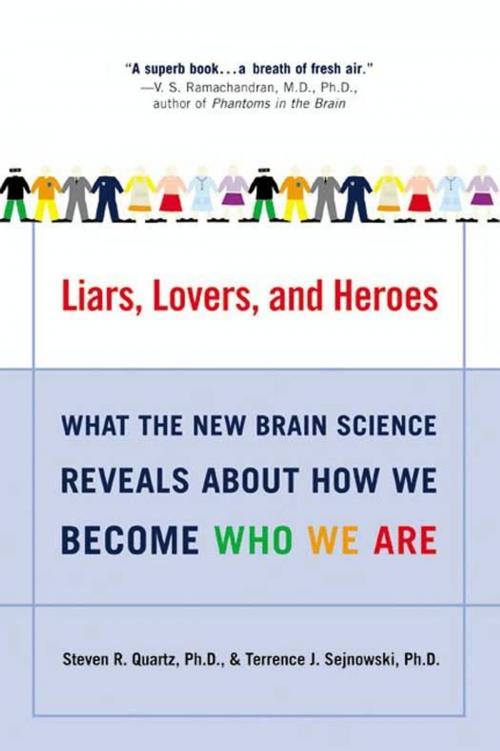Liars, Lovers, and Heroes
What the New Brain Science Reveals About How We Become Who We Are
Nonfiction, Health & Well Being, Psychology, Neuropsychology, Science & Nature, Science, Biological Sciences, Biology| Author: | Steven R Quartz, Terrence J Sejnowski | ISBN: | 9780062028662 |
| Publisher: | HarperCollins e-books | Publication: | December 14, 2010 |
| Imprint: | HarperCollins e-books | Language: | English |
| Author: | Steven R Quartz, Terrence J Sejnowski |
| ISBN: | 9780062028662 |
| Publisher: | HarperCollins e-books |
| Publication: | December 14, 2010 |
| Imprint: | HarperCollins e-books |
| Language: | English |
This exciting, timely book combines cutting-edge findings in neuroscience with examples from history and recent headlines to offer new insights into who we are. Introducing the new science of cultural biology, born of advances in brain imaging, computer modeling, and genetics, Drs. Quartz and Sejnowski demystify the dynamic engagement between brain and world that makes us something far beyond the sum of our parts.
The authors show how our humanity unfolds in precise stages as brain and world engage on increasingly complex levels. Their discussion embraces shaping forces as ancient as climate change over millennia and events as recent as the terrorism and heroism of September 11 and offers intriguing answers to some of our most enduring questions, including why we live together, love, kill -- and sometimes lay down our lives for others.
The answers, it turns out, are surprising and paradoxical: many of the noblest aspects of human nature -- altruism, love, courage, and creativity -- are rooted in brain systems so ancient that we share them with insects, and these systems form the basis as well of some of our darkest destructive traits. The authors also overturn popular views of how brains develop. We're not the simple product of animal urges, "selfish" genes, or nature versus nurture. We survive by creating an ingenious web of ideas for making sense of our world -- a symbolic reality called culture. This we endow to later generations as our blueprint for survival.
Using compelling examples from history and contemporary life, the authors show how engagement with the world excites brain chemistry, which drives further engagement, which encourages the development of cultural complexity. They also share provocative ideas on how human development may be affected by changes in our culture. Their insights, grounded in science and far-reaching in their implications, are riveting reading for anyone interested in our past, present, and future.
This exciting, timely book combines cutting-edge findings in neuroscience with examples from history and recent headlines to offer new insights into who we are. Introducing the new science of cultural biology, born of advances in brain imaging, computer modeling, and genetics, Drs. Quartz and Sejnowski demystify the dynamic engagement between brain and world that makes us something far beyond the sum of our parts.
The authors show how our humanity unfolds in precise stages as brain and world engage on increasingly complex levels. Their discussion embraces shaping forces as ancient as climate change over millennia and events as recent as the terrorism and heroism of September 11 and offers intriguing answers to some of our most enduring questions, including why we live together, love, kill -- and sometimes lay down our lives for others.
The answers, it turns out, are surprising and paradoxical: many of the noblest aspects of human nature -- altruism, love, courage, and creativity -- are rooted in brain systems so ancient that we share them with insects, and these systems form the basis as well of some of our darkest destructive traits. The authors also overturn popular views of how brains develop. We're not the simple product of animal urges, "selfish" genes, or nature versus nurture. We survive by creating an ingenious web of ideas for making sense of our world -- a symbolic reality called culture. This we endow to later generations as our blueprint for survival.
Using compelling examples from history and contemporary life, the authors show how engagement with the world excites brain chemistry, which drives further engagement, which encourages the development of cultural complexity. They also share provocative ideas on how human development may be affected by changes in our culture. Their insights, grounded in science and far-reaching in their implications, are riveting reading for anyone interested in our past, present, and future.















